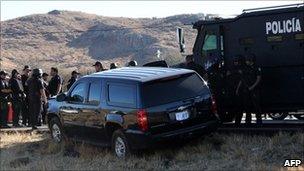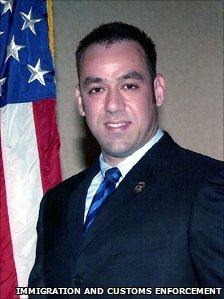How attack on US agents in Mexico may impact relations
- Published

Some reports suggest the pair were attacked after stopping at what appeared to be a checkpoint
One US immigration and customs agent was killed and a second was wounded in a suspected ambush on their car in Mexico. The BBC's Steve Kingstone investigates how the incident could affect the future of US-Mexico relations.
Life has become horribly cheap in Mexico's drug wars, but when the victim is an American special agent, the price rises sharply.
Tuesday's shootings have forced US-Mexican relations up Washington's list of priorities, even as the Obama administration responds to the tumultuous events in the Middle East.
It is not known precisely what the two Immigration and Customs Enforcement (ICE) agents were doing when they came under fire.
But typically, US officials assist their Mexican counterparts on investigations into gun-running, money laundering and cartel activity on both sides of the border.
"If it turns out that these two agents were directly targeted, it changes everything," says one US law enforcement official.
"Until now, the cartels haven't gone after American agents and uniformed personnel, on either side of the border," the official adds.
Negative role
ICE has about 30 agents in Mexico, and the Mexican government does not authorise US law enforcement officials to carry guns.

Jaime Zapata was wounded in the attack and later died from his injuries
The agent killed on Tuesday, Jaime Zapata, was on a temporary secondment from Texas.
"The disturbing part is that someone identified these two men as US law enforcement," says Diana Negroponte, a Latin America specialist with the Brookings Institution.
"That means there will now have to be restrictions on agents' movements. But how can you do your job when you're sat behind a computer?"
The Obama administration has acknowledged the negative role that the US plays in fuelling drug-related violence - from the demand for illegal drugs by American consumers to the trafficking of US-bought weapons into Mexico.
But Washington's relationship with President Felipe Calderon's government was strained last autumn after Hillary Clinton publicly labelled the cartels an "insurgency".
This killing has the potential to strain relations again.
Fernando Toranzo, San Luis Potosi state governor, said in a radio interview: "There was an attack where drug gang members... tried to kill two US officials on a federal highway."
Privately, US officials wonder how the gunmen were alerted to their target.
Someone appears to have tipped them off to the agents' presence.
Historical comparisons
Inevitably, comparisons are being drawn with the case of Special Agent Enrique "Kiki" Camarena, who was kidnapped, tortured and murdered in 1985, while working undercover in Mexico for the US Drug Enforcement Agency (DEA).
Former President Ronald Reagan's administration believed corrupt Mexican officials had been involved; and at one point, US investigators seized suspects in Mexico and "rendered" them across the border for questioning.
"The Camarena case was a thorn in the side of bilateral relations for many years," says Eric Farnsworth, of the Washington-based Council of the Americas.
"But these are very different times, and we have a far better relationship now. I hope no one will exploit this case for political gain," he adds.
There is also broad backing for the Obama administration's approach from former Bush officials.
"This administration has rightly made support for Felipe Calderon a high priority," says Julie Myers Wood, who was the head of ICE from 2006-2008.
"And I think they'll commit more to the effort after this. We've got to step up the pressure on the cartels."
But the US law enforcement official, speaking on condition of anonymity, is doubtful as to whether the murder of Jaime Zapata will signal a greater commitment from Washington.
"This killing will only be a game-changer if the White House chooses to make it one," he says.